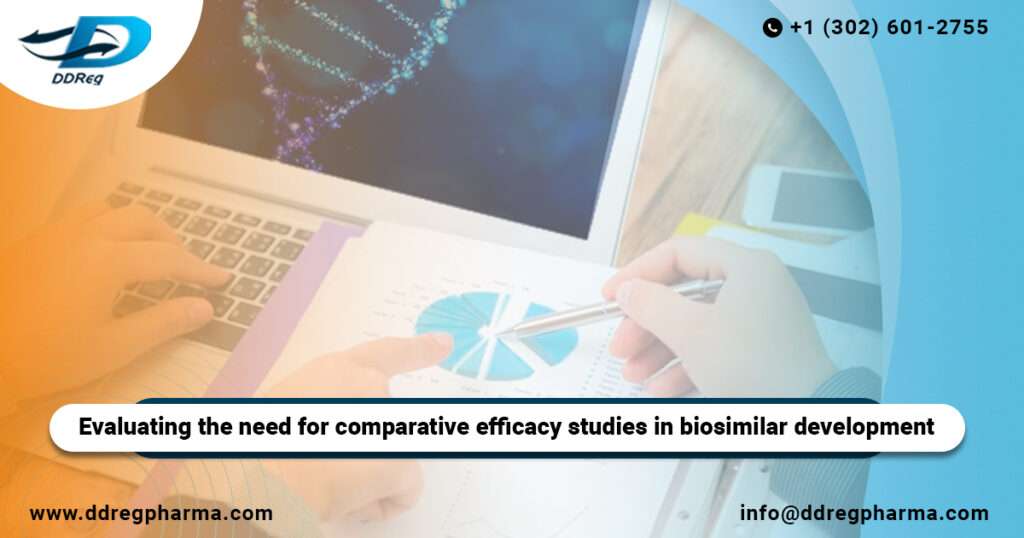Introduction
Long-term safety, efficacy, and immunogenicity data of licensed biosimilars do not raise concerns. State-of-the-art analytical and functional testing, as well as robust pharmacokinetic (PK) and pharmacodynamic (PD) studies are sufficient to demonstrate biosimilarity. In in-vivo animal studies and large confirmatory efficacy and safety studies are generally not needed. This blog provides and overview on the experience that various regulatory agencies, i.e., EMA, Health Canada, PMDA, and MFDS, have had regarding the need for comparative clinical efficacy studies for biosimilar development.
European Medicines Agency- European Union
Efficacy trials help to confirm comparable performance between the reference and biosimilar products. They should be adequately powered, randomized, in parallel groups and preferably double-blinded, by using efficacy endpoints. It is important for the study population to be representative of the reference product’s approved therapeutic indication/s and be sensitive towards detecting any differences. While an equivalence design is recommended, non-inferiority designs may also be accepted provided they are supplemented with justifications and discussed with the regulatory authority.
The European Medicines Agency (EMA) issues product specific guidance documents for which most do not strictly require an efficacy trial as PD markers are established as an appropriate efficacy indicator. EMA supports the comprehensive development of biosimilars and provides tailored scientific advice, especially for those molecules that are not explicitly covered in their guidelines (i.e., monoclonals). This provides advice and recommendations to biosimilar developers on the studies they should conduct after reviewing the quality, analytical, and functional data. An example for monoclonals is the tailored approach based on feasibility, for 2 Eculizumab biosimilars (Bekemv and Epysquli) where small PD studies of n=42 and n=50, respectively, in paroxysmal nocturnal haemoglobinuria (PNH) patients were conducted. Results on efficacy were based on the LDH/breakdown of RBCs. Going forward the EMA plans on issuing a concept paper that highlights the high level principles for tailored clinical approaches based on quality data, focused more on monoclonals.
Health Canada- Canada
Normally, a comparative clinical trial is important to rule out any clinically meaningful differences in safety and efficacy. However, if there is a clinically relevant PD endpoint, then an efficacy trial may not always be necessary. Majority of the biosimilar submissions with Health Canada have included comparative clinical efficacy studies that use surrogate outcomes, such as overall response rate, as primary endpoints. Biosimilar submissions without CES studies have characterizable PD endpoints with clinical relevance:
- G-CSFs- Absolute Neutrophil Count (AUEC-ANC)
- Insulins- Euglycemic clamp study (AUC-GIR, GIRmax)
- LMWHs- anti-fXa activity (AUC, Emax)
These PD markers were expected to be more sensitive toward product differences than relevant clinical outcomes. However, it is important to note that CESs sensitivities to product differences are difficult to establish and setting margins for equivalence relies on data from prior studies which could be limited. This could affect margin selection and result interpretation.
Pharmaceuticals and Medical Devices Agency - Japan
Between 2009 and 2022, 32 biosimilars have been approved by the PMDA Japan where:
- 23 were approved based on comparative analytical study, comparative PK study, and CES.
- 7 were approved based on comparative analytical study, comparative PK/PD study, and no CES. Of these, 3 biosimilars were filgrastim and 4 were insulin analogues.
- 1 was approved based on comparative analytical study, comparative PK study, and a PD study, without a CES. This was agalsidase beta BS.
- 1 was approved based on a comparative analytical study and CES only. This was ranibizumab BS.
For approved biosimilars that included a CES, where PK and/or PD studies are sufficient and assure comparability between the reference and biosimilar product with respect to the clinical endpoint, additional clinical studies for evaluating efficacy may be omitted.
For the 7 biosimilars that were approved without CES (i.e., filgrastim and insulin analogues), a CES was not requested because the PD marker was a validated, surrogate marker to determine clinical efficacy. As agalsidase beta BS was for the treatment of Fabry disease, which is classified as a rare disease, a CES was not requested.
Ministry of Food and Drug Safety- South Korea
According to the MFDS, biosimilar clinical study data should include information that can demonstrate comparability between the reference and biosimilar product. It should also support comparative assessment of immunogenicity. Clinical study data should be generated from confirmatory studies. While a CES is expected, if there is sufficient evidence that supports biosimilarity and can be drawn from comparative PK/PD studies, analytical, and in-vitro pharmacological studies, then a CES may not be required.
An example of a biosimilar having failed CES but obtaining approval with the MFDS is trastuzumab. The primary efficacy endpoint was complete response (CR) rate. Differences in pathological CR rates failed to demonstrate the pre-specified equivalence. However, an analysis revealed that pre-specified equivalence margin was met. Another example is teriparatide, which was approved in 2021 with PK comparability data only. Here, the primary efficacy endpoint was AUCt and Cmax. They key outcome was that equivalence was demonstrated by fulfilling the pre-specified equivalence margin (80% ~ 125%).
Conclusion
Comparative clinical efficacy trials help in confirming the comparable performance between the biosimilar and reference product. However, based on the evaluation by regulatory agencies such as EMA, Health Canada, PMDA, and MFDS, a comparative clinical efficacy study may not be required provided there is a robust and clinical relevant PD endpoint.
DDReg has provided its customers with regulatory consulting support for biosimilar development and registration in stringent and emerging markets. The dedicated team brings deep subject-matter expertise and the regulatory knowledge of key markets to support biosimilar registration. Read our blog on the Uptake of Biosimilars.
References and Further Reading
- US FDA. Virtual: Increasing the Efficiency of Biosimilar Development Programs- Reevaluating the Need for Comparative Clinical Efficacy Studies. United States Food and Drugs Administration. 2023
- Epysqli. European Medicines Agency. 2023
- Bekemv. European Medicines Agency. 2023

